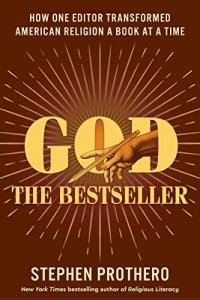 God, the Bestseller: How One Editor Transformed American Religion a Book at a Time
God, the Bestseller: How One Editor Transformed American Religion a Book at a Time
HarperCollins, 2023
Agent: Sandra Dijkstra
One summer evening in 1916 in Blanchester, Ohio, a sixteen-year-old farm boy was riding his horse past the town cemetery. The horse reared back and whinnied, and Eugene Exman saw God. For the rest of his life, he struggled to recreate that moment. Through a treasure of personal letters and papers, God, the Bestseller explores Exman’s personal quest. A journey that would lead him in the late 1920s to the Harper religious books department, which he turned during the Great Depression into a money-making juggernaut and the country’s top religion publisher.
Exman’s role in the shaping of American religion is undeniable. Here was a man who was ahead of his time and leading the rest of the nation through books on a spiritual exploration. Exman published bestsellers by the controversial preacher Harry Emerson Fosdick, the Catholic radical Dorothy Day, the Civil Rights pioneer Howard Thurman, and two Nobel laureates: Albert Schweitzer and Martin Luther King Jr. Exman did not just sit at a desk and read. In addition to his lifelong relationships with the most influential leaders of the day, Exman was on a spiritual journey of his own traversing the world in search of God. He founded a club of mystics, dropped acid in 1958, four years before Timothy Leary. And six years before The Beatles went to India, he found a guru there in 1962.
In the end, this is the story of the popularization of the religion of experience—a cultural story of modern America on a quest of its own. Exman helped to reimagine and remake American religion, turning the United States into a place where denominational boundaries are blurred, diversity is valued, and the only creed is that individual spiritual experience is the essence of religion.
Reviews:
"Boston University religion professor Prothero (Religious Literacy) chronicles the life of influential editor Eugene Exman in this edifying entry. Exman, who served as a religion editor at Harper & Row from 1928 to the mid-’60s, helped shape American cultural conversations about faith, shifting focus from “protestantism to pluralism, from dogma to feeling, and from organized religion to the religion of experience” by publishing books that targeted a middlebrow audience. Exman’s titles, which included Martin Luther King Jr.’s Stride Toward Freedom and Dorothy Day’s The Long Loneliness, offered insights from the “best and brightest” religious thinkers to lay readers, and he eventually brought writing on Hinduism and Buddhism to the mainstream. In 1947, Exman published Howard Thurman’s The Negro Spiritual Speaks of Life and Death, initiating a focus on works about race, eventually leading to his working with Nobel Peace Prize winners King and Albert Schweitzer on books that investigated nuclear disarmament and civil rights. As well, Prothero charts Exman’s religious evolution and his lifelong search for spiritual meaning that led him to psychedelics and Hindu meditation. Though sometimes the pages can be distractingly overcrowded with accounts of the personalities surrounding Exman, Prothero delivers penetrating takes on the ways religion interacted with popular culture during a period of change, and the whole is fortified by deep research. This fascinates." —Publishers Weekly